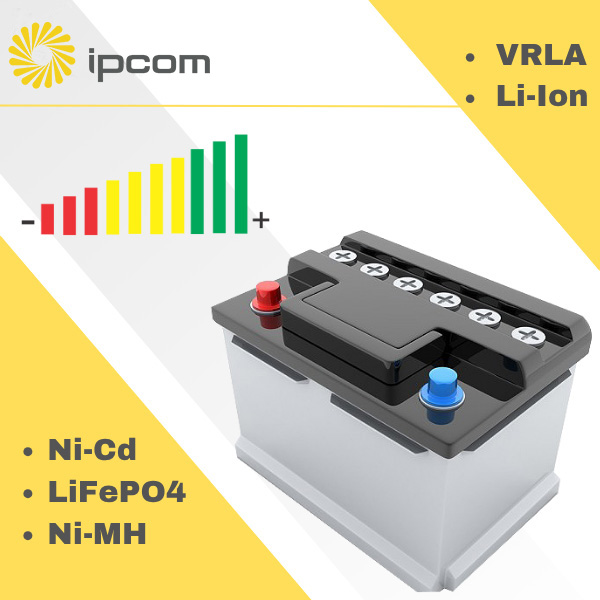Types of Batteries for UPS

Types of Batteries for UPS
The battery included with a UPS is the main component on which the backup runtime, reliability, and efficiency of all equipment using standby power during a power outage depend.
Lead-Acid Batteries (VRLA)
Lead-acid batteries are one of the most common battery types used in UPS systems. Sealed maintenance-free VRLA (Valve Regulated Lead Acid) models are especially popular, as they require no water refilling and offer high safety.
VRLA Subtypes
AGM (Absorbent Glass Mat) — provides vibration resistance, high energy density, and an affordable cost.
GEL (gel batteries) — the electrolyte is thickened to a gel state, which ensures a long service life and stable operation in extreme conditions.
Advantages: affordable price, reliability and stability, relatively easy installation and maintenance, versatility of use.
Disadvantages: limited charge/discharge cycles, sensitivity to deep discharge, reduced capacity during long storage periods.
Lithium-Ion Batteries (Li-Ion)
Lithium-ion UPS batteries are a modern solution with high energy density and long service life. They are increasingly replacing traditional lead-acid batteries in critical and industrial systems.
Advantages: high cycle life (up to 3000–5000 cycles), low weight and compact size, fast charging, wide temperature range.
Disadvantages: high cost, need for a specialized Battery Management System (BMS), higher safety and monitoring requirements.
Applications include telecommunications equipment, medical devices, data centers, server rooms, and video surveillance systems.
Nickel-Cadmium Batteries (Ni-Cd)
An industrial type of battery designed for use in environments with high demands for temperature stability and durability.
Advantages: high resistance to temperature fluctuations, long service life, tolerance to deep discharges, operation in extreme conditions.
Disadvantages: memory effect, environmental toxicity (cadmium), disposal difficulties, relatively high price.
Used in aviation, railway transport, power plants, and other critical infrastructure.
Nickel-Metal Hydride Batteries (Ni-MH)
A less common UPS battery type, more environmentally friendly and safer compared to Ni-Cd.
Advantages: eco-friendliness, reduced memory effect, higher energy capacity.
Disadvantages: higher cost compared to VRLA, sensitivity to high temperatures, shorter service life than lithium counterparts.
Lithium Iron Phosphate Batteries (LiFePO4)
Widely used in UPS systems where high cycle stability is important.
Advantages: up to 5000 charge-discharge cycles, increased safety (resistant to overheating and ignition), tolerance to deep discharge, wide operating temperature range.
Disadvantages: high cost, requires a BMS and intelligent control.
Used in medical facilities, data centers, and industrial applications.
How to Choose a UPS Battery
When selecting a battery, consider:
-
Capacity (Ah) — determines the duration of autonomous operation.
-
UPS compatibility — voltage, connection type, charging requirements.
-
Temperature conditions — especially important for outdoor or unheated environments.
-
Frequency of outages — if power failures are frequent, choose models with a higher cycle life.
-
Maintenance and disposal costs — lead-acid batteries are cheaper but require special disposal; lithium batteries cost more but last longer.
Conclusion
Choosing a UPS battery is an important step that affects the system’s stability. Lead-acid batteries (AGM and GEL) suit most standard tasks. Lithium-ion and LiFePO4 batteries offer high life span and reliability but come at a higher price. Nickel-cadmium batteries are designed for industrial and special conditions. Evaluate the load, budget, and operating environment to select the optimal battery type that ensures equipment protection and uninterrupted operation under any circumstances.


















